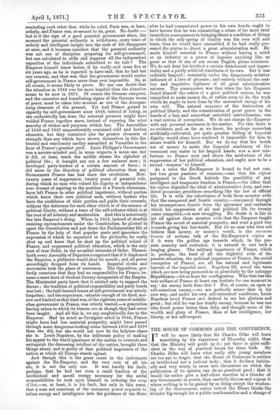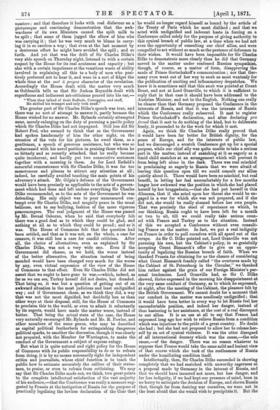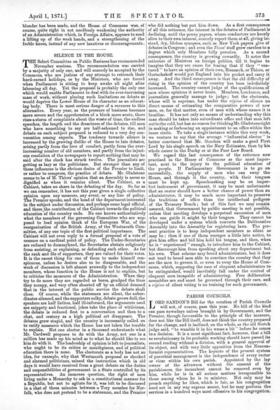THE. HOUSE OF COMMONS AND THE CONFERENCE,
IT will be more likely that Sir Charles Dilke will learn something by his experience of Thursday night, than that the Ministry will profit by it ; yet there is quite suffi- cient in the way of practical lesson for them both. Sir Charles Dilke will learn what really able young members are too apt to forget, that the House of Commons is neither an intellectual nor a judicial body ; that it declines habitu- ally and very wisely to enter into discussions on which the publication of its opinion can do no practical good ; that it would far rather give a half-silent sanction to a blunder of any Government in power, than carefully discuss and expose it where nothing is to be gained by so doing except the weaken- ing of the Government, unless indeed the House thinks the blunder big enough for a public condemnation and a change of masters ; and that therefore it looks with real disfavour on a picturesque and convincing demonstration that the awk- wardness of its own Ministers caused the spilt milk to be spilt ; that some of them jogged the elbow of him who was carrying it ; that he was very much to blame in carry- ing it in so careless a way ; that even at the last moment by a dexterous effort he might have avoided the spill ; and so forth. And yet that was the drift of Sir Charles Mike's very able speech on Thursday night, listened to with a certain respect by the House for its real acuteness and capacity ; but also with a certain impatience at the vexatious waste of ability involved in explaining all this to a body of men who posi- tively preferred not to hear it, and were in a sort of fidget the whole time at the ?nal a propos character of the revelation. Accordingly the House dealt with the matter very much as Goldsmith tells us that Sir Joshua Reynolds dealt with superfluous and indiscreet art-criticisms poured into his ear,— "When they talked of their Raffaels, Correggios, and stuff,
He shifted his trumpet and only took snuff."
The greater part of Sir Charles Mike's speech was true, and there was no sort of attempt to answer it, partly because the House wished for no answer. Mr. Rylands certainly attempted none, merely enlarging on the duty of pursuing a pacific policy which Sir Charles Dilke had not impugned. Still less did Sir Robert Peel, who seemed to think that as the Government had spoken handsomely of him the other night, on the occasion of the vote for his pictures, he owed them, as a gentleman, a speech of generous assistance, but who was so embarrassed with his novel position in praising those whom he co bitterly and so recently attacked, that he really became quite incoherent, and hardly put two consecutive sentences together with a meaning in them. As for Lord Enfield's mournful remonstrance with Sir Charles Dilke, it was far too monotonous and piteous to attract any attention at all ; indeed, he carefully avoided touching the main points of his adversary's attack. Mr. Gilpin's defence of the Government would have been precisely as applicable to the acts' of a govern- ment which had done and left undone everything Sir Charles Dllke recommended, as to the acts of the Government he was defending. His only object was to pour unmeasured con- tempt over Sir Charles Dilke, and magnify peace in the usual bellicose, not to say bullying, fashion of the more vigorous peacemongers. The real judgment of the House was passed by Mr. Bernal Osborne, when he said that everybody felt there was a good deal as to which they could be glad, and nothing at all as to which they could be proud ; and so it was. The House of Commons felt that the question had been settled, and that as it was not, on the whole, a case for censure, it was still less a case for candid criticism. After all, the choice of alternatives, even as explained by Sir Charles Dilke, was not a very wide one. Even if the Government did choose, as we hold, the worse instead of the better alternative, the situation instead of being mended would have been changed very much for the worse by any, even virtual expression of the view of the House of Commons to that effect. Even Sir Charles Dilke did not assert that we ought to have gone to war,—which, indeed, as far as we can see, Turkey herself did not desire, but dreaded. That being so, it was but a question of getting out of an awkward situation in the most judicious and least undignified way ; and if Government chose, as we think they did, a way that was not the most dignified, but decidedly less so than other ways at their disposal, still, for the House of Commons to proclaim this to the world, or even to admit it reluctantly by its regrets, would have made the matter worse, instead of better. That being the actual state of the case, the House very naturally encouraged Mr. Rylands and Mr. R. Fowler, and other members of the same genus, who may be described as capital political featherbeds for extinguishing dangerous political sparks, to smother the discussion, though it was clearly not prepared, with the Member for Warrington, to make the conduct of the Government a subject of express eulogy.
But what it is quite natural and right policy for the House of Commons with its public responsibility to do or to refrain from doing, it is by no means necessarily right for independent critics and journalists, whose chief function is to teach the public how to estimate accurately the calibre of their states- men, to praise, or even to refrain from criticizing. We may say that Sir Charles Mike made out, we think, two great points to the complete intellectual satisfaction of the vast majority of his audience,—that the Conference was really a measure sug- gested by Prussia at the instigation of Russia for the purpose of practically legalizing the lawless declaration of the Czar that he would no longer regard himself as bound by the article of the Treaty of Paris which he most disliked ; and that we acted with undignified and indecent haste in forcing on a Conference called solely for the purpose of giving authority to this cynical breach of public law, at a time when we had not even the opportunity of consulting our chief allies, and were compelled to act without so much as the pretence of deference to their wishes. It would have been impossible for Sir Charles Mike to demonstrate more clearly than he did that Germany moved in the matter under confessed Russian sympathies, though, of course, as a matter of form, disapproving the mode of Prince Gortschakoff's communication ; nor that Ger- many even went out of her way to snub us most wantonly for the publication of exciting and inflammatory despatches. We know it is sometimes said that this snub was pointed at Count Beust, and not at Lord Granville, to which it is sufficient to reply that in that case it should have been addressed to the Austrian Minister, and not to the English. Nothing can really be clearer than that Germany proposed the Conference in the interests of Russia, and that it was the interests of Russia which the Conference really subserved. It met to register Prince Gortschakoff's declaration, and after declaring pro forma' that it met to do nothing of the kind, but to deliberate freely, it proceeded to do the work for which it met.
Again, we think Sir Charles Dilke really proved that it would have been far better for British dignity, for the peace of Europe, and for the interests of public law, had we discouraged a scratch Conference got up for a special purpose, while our chief ally was quite unable to take a serious part in the matter, instead of snatching at it as eagerly as a timid child snatches at an arrangement which will prevent it from being left alone in the dark. There was real mischief in proclaiming so eagerly to Russia that we were afraid of leaving this question open till we could consult our allies quietly about it. There would have been no mischief, but real benefit, in letting her feel uncomfortably for a few months longer how awkward was the position in which she had placed herself by her braggadocio,—that she had put herself in this dilemma, that if she acted upon her threat she would be en- gaged in a war for which she was not prepared, and if she did not, she would be really shamed before her own people. That was precisely the stool of repentance on which, to our thinking, Russia ought to have been left for a month or two to sit, till we could really take serious coun- sel with France and Turkey as to the situation. Instead of this we accepted a Conference without even consult- ing France on the matter. In fact, we put a real indignity on France in order to pull ourselves with all speed out of the scrape. As Sir C. Dilke pointed out, Lord Granville was not pursuing his own, but the Cabinet's policy, in so gratefully accepting Count Bismarck's offer to give us an oppor- tunity of legalizing the Russian breach of faith. When we thanked Prussia for obtaining for us the chance of considering what Count Bismarck frankly called "the overtures made by the Cabinet of St. Petersburg in the Circular," we thanked him rather against the grain of our Foreign Minister's per- sonal tendencies. Lord Granville had, as Sir C. Dilke showed, thrice expressed in the morning his disappointment at the very same conduct of Germany, as to which he expressed, at night, after the meeting of the Cabinet, the pleasure felt by the British Government. We cannot doubt for a moment that our conduct in the matter was needlessly undignified ; that it would have been better in every way to let Russia feel her uncomfortable position, and indeed her danger, instead of thus hastening to her assistance, at the cost of a real disrespect to our allies. It is no use at all to say that France had expressed long ago her wish to relieve Russia from a condition which was injurious to the pride of a great country. No doubt she had ; but she had not proposed to allow her to release her- self by an act of cynical violence. It was the utter disregard of all international decency which was the cause,—the sole cause,—of the danger. There was no reason whatever to suppose that France would take the same mild and lenient view of that course which she took of the restlessness of Russia under the humiliating condition itself.
Intellectually, then, Sir Charles Dilke succeeded in showing completely that we had snatched with unworthy eagerness at a proposal made by Germany in the interest of Russia, and that we should have incurred not more, but less danger, and far less indignity, if we had kept our presence of mind, been in no hurry to anticipate the decision of Europe, and shown Russia that, though far from desiring war ourselves, we were not in the least afraid that she would wish to precipitate it. But the blunder has been made, and the House of Commons was, of course, quite right in not needlessly weakening the authority of an Administration which, in Foreign Affairs, appears to need a lifting up of the weak hands, and a strengthening of the feeble knees, instead of any new laxatives or discouragements.


































 Previous page
Previous page